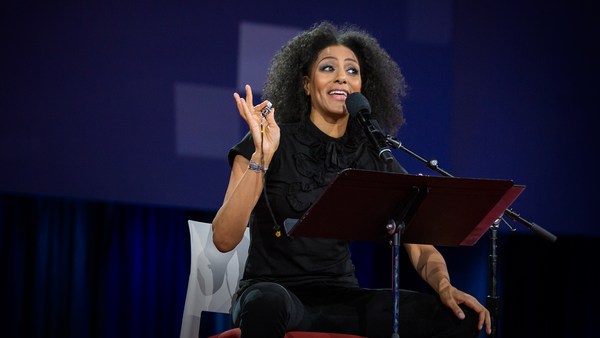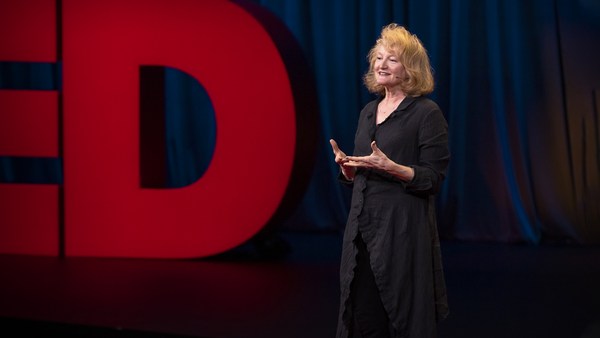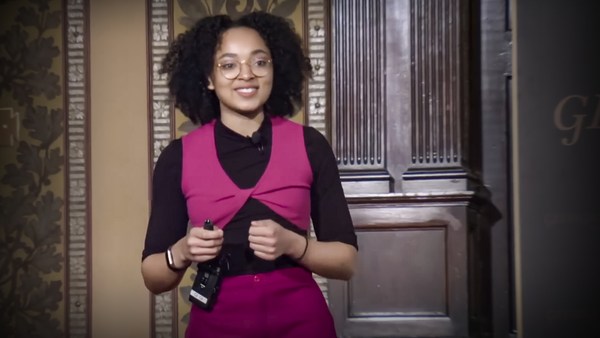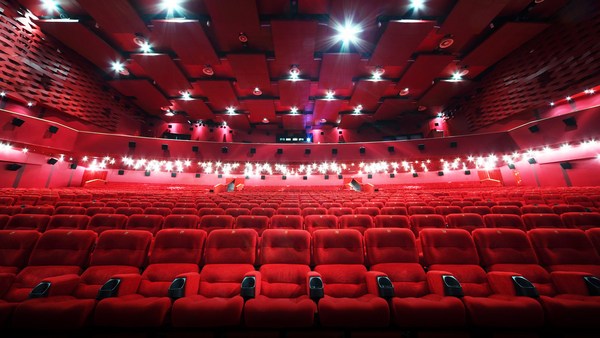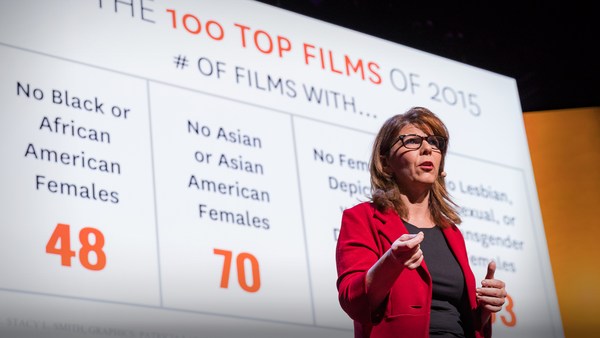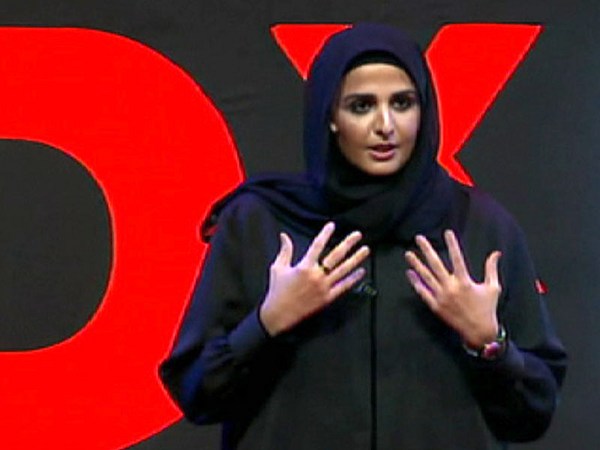As a writer and performer, for years, I have been known for giving voice or voices to the many diverse characters I play onstage and, more recently, in my film “Sell/Buy/Date.” My characters, these characters, some of whom you are about to meet, are based on people from my real life, including my very real mixed race family.
Like me. My name is Lorraine. Hi there, TED. It's wonderful. I'm kvelling to be here with you all again. Thank you for having me. Please don't AI me.
(Laughter)
So Lorraine is based partly on a real relative of mine. But don't worry, I changed the names to protect the innocent and especially the guilty.
Claro que sí. Hi, I'm Nereida. Muy buenas tardes, everybody. I am also from Sarah Jones's family, but I'm a little bit nervous because I was so excited to come back here to TED, and then Sarah Jones was like, "We are going to be talking about how everyone is afraid of cancel culture." And I was like, "First of all, we are here speaking as people from different backgrounds. Are we even allowed to do that anymore? Like what if people confuse what we're doing with cultural appropriation, which is probably the fastest way to get us all canceled? Oh, my God. No, thank you.”
As you can hear, my characters have their own take on things, but I had a very personal experience of cancel culture, and I wanted to share about it here. And I’m hoping that if we’re willing to really talk about all of this, maybe we can stop living in fear of it and get at what's actually underneath it. Now you’ve already met Lorraine and Nereida ...
But you haven’t met me. Hi, I'm Bella. She/her pronouns. I’m a double major, feminism and philosophy, and actually social justice. Just auditing.
(Laughter)
But also I'm minoring in social media with a concentration on notable TikTok memes.
(Laughter)
But as far as, like, cancel culture with, like, older people ... I mean, like, not to say that, like, you're all older, but, like, just some of you are more, like, chronologically advanced ...
(Laughter)
people and, like, more successful, right? So, like, obvi, you have, like, the most to lose, right? Um. So --
(Applause)
Bella makes an annoying but very good point, right? This is a global phenomenon with immeasurable impact on culture, commerce. And I know, the feeling is over the past few years, there has suddenly been this rise of a terrifying specter that everybody has to fear. But in my experience, cancel culture actually hasn't been sudden, and it is certainly not new.
If the definition of being canceled is being silenced, excluded, disempowered and disinvited from the larger conversation, then for many of us, cancel culture has defined our lives for most of history. I mean, spoiler alert, I'm Black. Also a woman. I have Latino relatives. I'm even a little part Jewish. I know what it is to have cancellation baked into who I am.
So some of our experiences down through history have amounted to a kind of pre-cancellation. It's only now that this new kind of cancellation has begun to impact the powerful and dominant with the pre-canceled folk saying, "Hey, this system has been failing a lot of us for centuries. So now it's our turn. We're going to take justice into our own hands and cancel you."
And I agree that we need the equity and justice our laws promise but often don't deliver. For example, harmful and even criminal behavior, when committed by powerful people, has often gone completely unpunished. And in situations like that, yeah, cancel culture can at least offer some form of restitution.
Now that said, as a system, it's far from perfect. I mean, once people are canceled, how are we actually holding them accountable? Like there are those creepy comedians or CEOs who might have to hole up in their mansions for a little while. But before you know it, a lot of them are right back in Madison Square Garden or otherwise in business. And meanwhile, the larger systems that created them keep right on going.
Now even worse, sometimes people who are the opposite of the Harvey Weinsteins of the world can get lumped in and dragged as soon as one voice screams “cancellation” in a crowded theater. I mentioned my film "Sell/Buy/Date" earlier. It was inspired by a play of the same name. I even performed an early excerpt of it right here at TED. And it’s a one-person show that explores themes of women and sex and power through the lens of the sex industry.
But if you don't know my work, let me give you a little bit more context. Since I grew up watching racial, ethnic and other stereotypes, or no images of us at all, my work has always been about accurately portraying people in our full humanity. And in the case of "Sell/Buy/Date," which was inspired by real people in the sex industry whom I had spent years getting to know and who generously trusted me with their stories onstage, I was grateful my work was received as a loving tribute to those diverse people and ideas.
That is, until the film version was announced in the press. The film was backed by a team of A-list Hollywood producers. And so suddenly this was a much bigger platform. And people who did not know me and my connection to the topic assumed I was a cultural appropriator with bad intentions, and suddenly I was under brutal attack. I mean, strangers from all over the internet were coming for me personally, threatening my funders, promising to cancel anyone associated with my film. Why? Well, these cancelers were actually concerned sex workers. They were afraid my film would be disrespectful to the already very marginalized people in the sex industry. And I get that. But before I could even make the film and include the voices of sex workers, as I had always planned, they said I had no right to tell my story since I'm not in the industry myself. And they were more than willing to destroy me and my career.
Ultimately, I hung in there. I made the film, which shows me wrestling with these issues, and it was critically acclaimed by the “New York Times.” But along the way, I, the film and the very people it was trying to serve all suffered harm that may never be undone. I've lost friendships and opportunities that can never be restored. But even worse, the distraction of the cancellation pulled focus from the goal of destigmatizing people in the sex industry. And that is another huge problem with cancel culture, is that at its worst it can end up hurting the very people it's trying to help. And even at its best, it can still fuel this continuous loop of fear. Like there are the marginalized folks who fear very understandably that they'll be disempowered yet again. And then there are the people who are in power and fear losing that power. Or they secretly feel like they're being indicted rather than invited into a conversation. And nobody is really evolving under circumstances like that. Meanwhile, the larger culture of inequality not only isn't improving, it's actually getting worse out here because everybody's just reacting from their amygdala.
So ... What's the solution? Well, kind of like with my film, I'm not here to tell you what you have to think.
Yes, but I will listen. Even the nice Black girl is saying cancel culture is not the solution. So I think we should all just say, "Poo poo poo. Glad we cleared that up. We can all move on, thank God."
Yeah, well -- Yes but, Lorraine, it’s not that simple because many of us, you know, the pre-canceled people, we can't just move on without a more equitable, a better society. The good news is, I believe that starts less with looking at Twitter and more with, well, looking at the man in the mirror. At the risk of invoking a very canceled pop icon, I'm sorry.
Research shows that if we try looking really honestly at ourselves and any biases or privilege we may have, it could actually improve our quality of life. A recent piece in "Scientific American" about unlearning certain prejudices pointed to research that -- wait for this -- even with power, when the dominant group fears losing that power, they are more anxious, more angry, defensive, paternalistic, which harms us all. So whether we're the ones who fear being canceled or we're trying to hold others to account, we can all start a daily practice of being self-accountable. To notice, without judgment, any tendencies in ourselves that could be hurtful to others. And I'm not saying that unlearning our biases will automatically shield us from cancellation, but we can at least try to own any mistakes we might be making. And we don’t have to do it alone. We can surround ourselves with trusted people who may be more aware of certain issues than we are. Think of them as your own personal cancel counsel.
(Laughter)
Yeah? OK.
Lastly, let’s say we’re the ones doing the canceling. Looking honestly at ourselves can keep us from automatically assuming the worst in people who could be well-meaning. Now I know, I know. Don’t @ me. A lot of these people out here getting canceled do not mean well. Or even if they do, good intentions might not help much when a stranger asks if they can touch your hair. I mean, unless that stranger is Jason Momoa. Just saying.
(Laughter)
He has my consent.
But the point is, we don't just want to ignore thoughtless missteps or worse. But I do believe even alongside the painful inequities, we are still mostly just people who are trying to do the right thing. And if we are falling short of that, banishment alone doesn't actually solve the problem. It just creates more hurt and angry people.
Now, I'm hoping that without pretending this is an even playing field, that we can still empathize with each other just a little bit more. Maybe you can even become the cancel counsel to someone you would otherwise have written off. Invite them to share where they were trying to come from, and then show them any biases they might have been blind to.
I'm not saying it's easy. I know a lot of us are really tired, but I also think we would be amazed at how connecting to someone on that level could take a hurtful event and turn it into a chance for healing and real progress. Now, listen, I'm -- I'm not saying any of us will ever be perfect, but maybe we can try to give each other and ourselves the grace of assuming good intentions while still doing the work that acknowledges how far we have to go.
Thank you.
(Applause)
